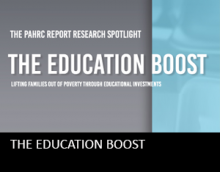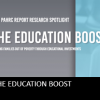0
Report
Community:
Apr 1, 2019
College Promise programs aim to make students believe they can afford college, and to give them the opportunity to go to college and earn degrees without taking on significant debt. At the core of all College Promise programs is a scholarship: All eligible College Promise students receive scholarships that may cover up to 100 percent of tuition and fees at postsecondary institutions. Additionally, many Promise programs are designing, implementing, and refining additions to their models by providing students with support services once they enroll in college. MDRC’s College Promise Success Initiative (CPSI) provides important lessons for Promise programs interested in including such services.This brief shares early lessons from CPSI about how different Promise programs are designing, implementing, and refining their models with embedded student services in mind.
Authored by: Jacklyn Willard, Andrea Vasquez, and Marco Lepe for MDRC
Topics: Education, Low-income, Post-secondary, Research, Youth
 Shared by Housing Is
Shared by Housing Is
Housing Is posted a
on Apr 24, 2019
Jacklyn Willard, Andrea Vasquez, and Marco Lepe for MDRC
College Promise programs aim to make students believe they can afford college, and to give them the opportunity to go to college and earn degrees without taking on significant debt.
0
Report
Community:
Apr 20, 2019
Detroit’s Promise program was designed to encourage college attendance among some of the nation’s most underserved students, those in Detroit, Michigan. The next step was to help students succeed once they enrolled in college. To do so, MDRC and the Detroit Promise partnered to create the Detroit Promise Path, an evidence-based student services program. Detroit Promise Path students begin meeting with college coaches in the late summer before their first semester of college. They are given an incentive to attend coaching meetings in the form of a monthly gift card refilled with $50 each month that they meet with coaches as directed. The program lasts all year, including summer semesters, when students are encouraged to enroll in summer classes or engage in a local summer jobs program. The entire operation is supported by a management information system.
Authored by: MDRC
Topics: Education, Low-income, Midwest, Post-secondary, Research
 Shared by Housing Is
Shared by Housing Is
Housing Is posted a
on Apr 24, 2019
Detroit’s Promise program was designed to encourage college attendance among some of the nation’s most underserved students, those in Detroit, Michigan. The next step was to help students succeed once they enrolled in college.
0
Report
Community:
Jan 10, 2019
There isn't federal data on food insecurity among college students nationally, so the GAO reviewed 31 studies on the topic, showing that most concluded that over a third of college students don't always have enough to eat.
Authored by: Elissa Nadworny and Clare Lombardo for NPR
Topics: Education, Food insecurity, Health, Legislation & Policy, Low-income, Nutrition, Post-secondary, Research, Youth
 Shared by Housing Is
Shared by Housing Is
Housing Is posted a
on Jan 16, 2019
Elissa Nadworny and Clare Lombardo for NPR
There isn't federal data on food insecurity among college students nationally, so the GAO reviewed 31 studies on the topic, showing that most concluded that over a third of college students don't always have enough to eat.
0
Webinar
Community:
Dec 11, 2018
CLPHA’s Education Working Group hosts a webinar including presentations on efforts from the Chicago Housing Authority to work with residents on pursuing postsecondary opportunities, as well as an update from HUD’s Office of Policy Development & Research on data collection around tracking and increasing FAFSA utilization.
Authored by: CLPHA
Topics: CLPHA, Cost effectiveness, Data sharing, Education, Funding, Housing, Housing Is Working Group, Low-income, Metrics, Midwest, Post-secondary, Research, Stability, Youth
 Shared by Mica O'Brien
Shared by Mica O'Brien
Mica O'Brien posted a
on Dec 12, 2018
CLPHA’s Education Working Group hosts a webinar including presentations on efforts from the Chicago Housing Authority to work with residents on pursuing postsecondary opportunities, as well as an update from HUD’s Office of Policy Development & Research on data collection around tracking and inc
0
Research
Community:
Dec 1, 2018
ASAP is a comprehensive program that provides students with up to three years of financial and academic support and other support services to address multiple barriers to student success, with the goal of helping more students graduate within three years. MDRC’s random assignment evaluation of CUNY ASAP found that after three years, 40 percent of ASAP students graduated compared with just 22 percent of control group students. After six years, ASAP students continued to outperform the control group, with 51 percent of the program group earning degrees compared with 41 percent of the control group.
Authored by: MDRC
Topics: Education, Low-income, Midwest, Post-secondary, Research, Youth
 Shared by Mica O'Brien
Shared by Mica O'Brien
Mica O'Brien posted a
on Dec 12, 2018
ASAP is a comprehensive program that provides students with up to three years of financial and academic support and other support services to address multiple barriers to student success, with the goal of helping more students graduate within three years.
0
Case study
Community:
Dec 1, 2018
In 2014, as part of the Accelerated Study in Associate Programs (ASAP) Ohio Demonstration, Lorain County Community College launched Students Accelerating in Learning (SAIL), a comprehensive student success program that is substantially improving persistence and graduation rates among low-income students. Given the program’s results, Lorain has committed to sustaining the program and expanding it to serve most of its low-income student population. If the college achieves this goal, it could close attainment gaps between low-income and more affluent students, markedly boost its overall graduation rate, gain revenue through increased tuition and performance-based funding, and, most important, significantly enhance the educational and career trajectories of its students. During early implementation, the college took several steps to fund and institutionalize SAIL that are
now making it easier to sustain the program. This brief draws lessons from Lorain’s experience to shed light on how other postsecondary institutions may adopt and sustain similar programs to increase student success.
Authored by: Camielle Headlam for MRDC
Topics: Education, Low-income, Post-secondary, Research
 Shared by Mica O'Brien
Shared by Mica O'Brien
Mica O'Brien posted a
on Dec 12, 2018
Camielle Headlam for MRDC
In 2014, as part of the Accelerated Study in Associate Programs (ASAP) Ohio Demonstration, Lorain County Community College launched Students Accelerating in Learning (SAIL), a comprehensive student success program that is substantially improving persistence and graduation rates among low-income stud
0
News Article
Community:
Dec 11, 2018
A mailer sent to low-income students with that promise led to a major jump in enrollment at the University of Michigan, according to a new study.
Authored by: Adam Harris for The Atlantic
Topics: Education, Funding, Low-income, Post-secondary, Research, Youth
 Shared by Housing Is
Shared by Housing Is
Housing Is posted a
on Dec 11, 2018
Adam Harris for The Atlantic
A mailer sent to low-income students with that promise led to a major jump in enrollment at the University of Michigan, according to a new study.
0
Report
Community:
Oct 18, 2018
A program called Find the Fit, which combines personalized planning materials and text messaging for students, and training webinars for advisors, increased the number and selectivity of colleges to which students apply. This report, the first from a six-year study, determined that Find the Fit led to some changes in the advising within Upward Bound and in students’ actions related to enrolling in a more selective college.
Authored by: Alina Martinez, Tamara Linkow, Hannah Miller, and Amanda Parsad for Mathematica
Topics: Education, Low-income, Post-secondary, Research, Youth
 Shared by Mica O'Brien
Shared by Mica O'Brien
Mica O'Brien posted a
on Nov 16, 2018
Alina Martinez, Tamara Linkow, Hannah Miller, and Amanda Parsad for Mathematica
A program called Find the Fit, which combines personalized planning materials and text messaging for students, and training webinars for advisors, increased the number and selectivity of colleges to which students apply.
0
Report
Community:
Oct 24, 2018
CLPHA’s Housing Is Initiative is engaged in a number of cross-sector activities focused on developing partnerships, facilitating a community of practice, resource development, promoting best practices, online collaboration, policy and advocacy, and training and education. Read about recent activities in this Fall Update.
Authored by:
Topics: Child welfare, CLPHA, Community development, Cost effectiveness, Data sharing, Early childhood, Education, Family engagement, Funding, Health, Homelessness, Housing, Low-income, Medicaid / Medicare, Mental health, Partnerships, Place-based, Post-secondary, Research, Stability, Substance abuse, Workforce development, Youth
 Shared by Mica O'Brien
Shared by Mica O'Brien
Mica O'Brien posted a
on Oct 24, 2018
CLPHA’s Housing Is Initiative is engaged in a number of cross-sector activities focused on developing partnerships, facilitating a community of practice, resource development, promoting best practices, online collaboration, policy and advocacy, and training and education.
1
Report
Community:
May 1, 2018
Our initial report—which followed participants around the country over three years—found, among other things, that Year Up increased participants’ average quarterly earnings by more than 50 percent. These are the largest gains in earnings measured to date in random assignment studies of workforce training programs for youth and adults.
Authored by: David Fein and Jill Hamadyk for Abt Associates
Topics: Asset building, Education, Low-income, Mobility, Post-secondary, Research, Workforce development, Youth
 Shared by Housing Is
Shared by Housing Is
Housing Is posted a
on Aug 16, 2018
David Fein and Jill Hamadyk for Abt Associates
Our initial report—which followed participants around the country over three years—found, among other things, that Year Up increased participants’ average quarterly earnings by more than 50 percent.
0
Report
Community:
Jul 11, 2018
To help inform policymakers and move policy forward, this paper discusses the current state of housing in the United States, provides a conceptual framework for housing as a platform to improve educational outcomes for children, reviews the existing evidence that supports conceptual models, and identifies the major gaps in research. Finally, it proposes a list of projects that make up a research agenda for understanding the issue and guiding investments in new research.
Authored by:
Topics: Attendance, Child welfare, Early childhood, Education, Housing, Literacy, Low-income, Mental health, Post-secondary, Preventative care, Racial inequalities, Research, Safety, Stability, Youth
 Shared by Housing Is
Shared by Housing Is
Housing Is posted a
on Jul 11, 2018
To help inform policymakers and move policy forward, this paper discusses the current state of housing in the United States, provides a conceptual framework for housing as a platform to improve educational outcomes for children, reviews the existing evidence that supports conceptual models, and iden
0
News Article
Community:
Feb 15, 2018
Authored by: Jon Marcus and Matt Krupnick for The Hechinger Report (originally featured in The Atlantic)
Topics: Community development, Education, Family engagement, Low-income, Midwest, Post-secondary, Research, Workforce development, Youth
 Shared by Housing Is
Shared by Housing Is
Housing Is posted a
on Jul 5, 2018
Jon Marcus and Matt Krupnick for The Hechinger Report (originally featured in The Atlantic)
0
Report
Community:
Jun 29, 2017
Violent-crime arrests drop by 33 percent for program participants.
Authored by: UChicago News
Topics: Child welfare, Criminal justice, Education, Low-income, Midwest, Mobility, Out-of-school time, Post-secondary, Racial inequalities, Research, Safety, Substance abuse, Workforce development, Youth
 Shared by Housing Is
Shared by Housing Is
Housing Is posted a
on Jul 5, 2018
Violent-crime arrests drop by 33 percent for program participants.
1
News Article
Community:
Jul 3, 2018
Researchers have shown — and teachers know — that schoolchildren exposed to neighborhood violence can have a tougher time learning, experiencing more stress and depression than their peers growing up in safe neighborhoods. But a Johns Hopkins University sociologist discovered that the consequences of neighborhood violence reach further than previously known, even spilling over to students who come from safe neighborhoods. Using crime and student data from Chicago, Julia Burdick-Will linked exposure to neighborhood violence to a drop in test scores, an effect that extended to students coming from communities that experienced little or no violence.
Authored by: Moriah Balingit for The Washington Post
Topics: Attendance, Child welfare, Community development, Depression, Education, Health, Low-income, Mental health, Midwest, Out-of-school time, Post-secondary, Racial inequalities, Research, Youth
 Shared by Mica O'Brien
Shared by Mica O'Brien
Mica O'Brien posted a
on Jul 3, 2018
Moriah Balingit for The Washington Post
Researchers have shown — and teachers know — that schoolchildren exposed to neighborhood violence can have a tougher time learning, experiencing more stress and depression than their peers growing up in safe neighborhoods.
0
News Article
Community:
Jul 2, 2018
Poor children don't struggle in school because of their parents. They struggle because of poverty.
Authored by: Mical Raz for The Washington Post
Topics: Attendance, Child welfare, Dual-generation, Early childhood, Education, Family engagement, Food insecurity, Grade-level proficiency, Housing, Legislation & Policy, Literacy, Low-income, Out-of-school time, Post-secondary, Racial inequalities, Research, School-readiness, Youth
 Shared by Mica O'Brien
Shared by Mica O'Brien
Mica O'Brien posted a
on Jul 3, 2018
Mical Raz for The Washington Post
Poor children don't struggle in school because of their parents. They struggle because of poverty.
0
Research
Community:
Mar 1, 2017
Authored by: The Public and Affordable Housing Research Corporation (PAHRC)
Topics: Education, Housing, Low-income, Post-secondary, Research, Workforce development
 Shared by Keely Stater
Shared by Keely Stater
Keely Stater posted a
on Jun 6, 2017
The Public and Affordable Housing Research Corporation (PAHRC)
 Shared by Housing Is
on Apr 24, 2019
Shared by Housing Is
on Apr 24, 2019
 Shared by Housing Is
on Apr 24, 2019
Shared by Housing Is
on Apr 24, 2019

 Shared by Housing Is
on Jan 16, 2019
Shared by Housing Is
on Jan 16, 2019


 Shared by Housing Is
on Dec 11, 2018
Shared by Housing Is
on Dec 11, 2018


 Shared by Housing Is
on Aug 16, 2018
Shared by Housing Is
on Aug 16, 2018

 Shared by Housing Is
on Jul 11, 2018
Shared by Housing Is
on Jul 11, 2018
 Shared by Housing Is
on Jul 5, 2018
Shared by Housing Is
on Jul 5, 2018

 Shared by Housing Is
on Jul 5, 2018
Shared by Housing Is
on Jul 5, 2018




 Shared by Keely Stater
on Jun 6, 2017
Shared by Keely Stater
on Jun 6, 2017






